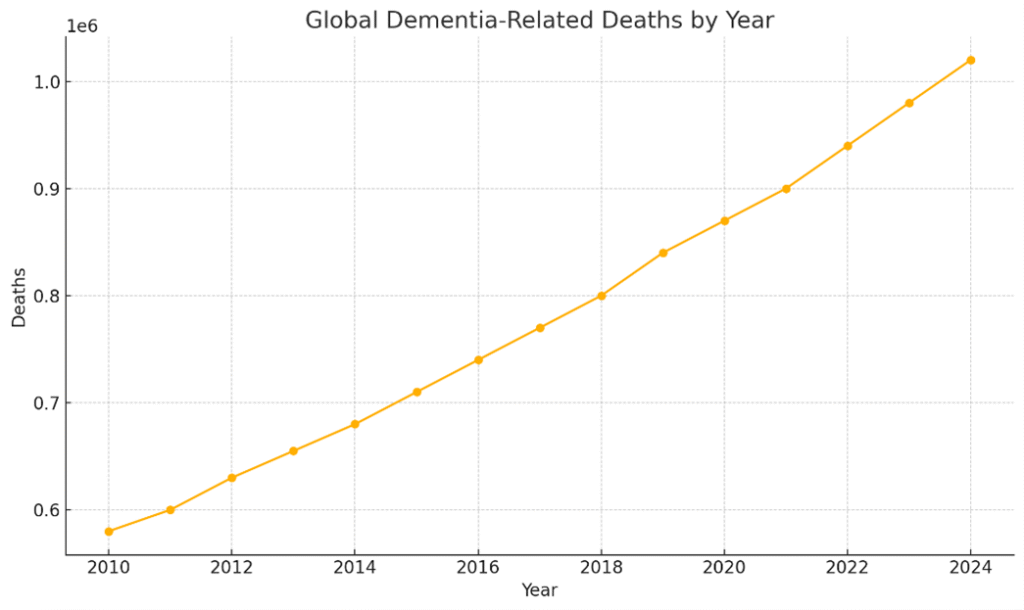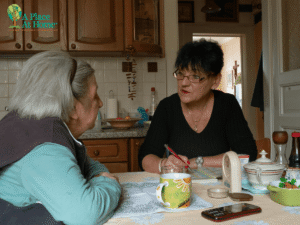
Understanding the Journey, From Diagnosis to Care
When a loved one is diagnosed with dementia, one of the first questions families ask is, “How long do people live with this condition?” It’s a natural question—and an important one. But the answer isn’t always simple. Dementia affects each person differently, and life expectancy depends on the type, age of diagnosis, overall health, and level of care provided.
In this guide, we’ll walk you through everything you need to know what dementia is, how it differs from Alzheimer’s, population and death statistics, common early signs, what families can do to help, and how to provide compassionate in-home care that truly makes a difference.
What is Dementia?
Dementia is not a specific disease but a general term for the impaired ability to remember, think, or make decisions that interferes with daily life. It’s caused by damage to brain cells, affecting communication between brain regions.
There are over 100 types of dementia, but the most common form is Alzheimer’s disease, which accounts for 60–80% of all cases.
Other types include:
- Vascular dementia
- Lewy body dementia
- Frontotemporal dementia
- Mixed dementia (a combination of types
Dementia is on the rise: Global impact and mortality
Dementia has become one of the most serious global health challenges. According to the World Health Organization (WHO):
- Over 55 million people currently live with dementia worldwide
- Nearly 10 million new cases are diagnosed each year
- Dementia is the 7th leading cause of death globally
In the U.S. alone:
- Over 6.9 million Americans aged 65 and older are living with Alzheimer’s in 2024
- That number is projected to grow to 13 million by 2050 if no cure is found
Dementia-Related Deaths by Year (2010–2024)

Here’s a look at how dementia-related deaths have increased over time:
This trend reflects an aging global population, increased life expectancy, and improved diagnosis rates—but it also shows the urgent need for support and care services.
How long can someone live with dementia?
Life expectancy after a dementia diagnosis varies. On average, a person lives between 4 to 8 years after diagnosis, but some may live as long as 10 to 20 years.
Key factors that influence life expectancy:
- Type of dementia – People with Alzheimer’s tend to live longer than those with vascular dementia
- Age at diagnosis – Younger individuals may live longer than those diagnosed later in life
- Overall health – Coexisting conditions like heart disease or diabetes can shorten lifespan
- Quality of care – Compassionate, consistent in-home care can enhance both longevity and quality of life
What are the early signs of Dementia you shouldn’t ignore?
Spotting dementia early can lead to a more effective care plan and better outcomes. Here are common early symptoms progression:
Forgetting recent events or conversations
While everyone forgets things sometimes, regularly forgetting things that just happened — like a conversation earlier in the day — can be an early indicator of dementia.
Repeating questions or losing track of time
Someone in the early stages of dementia may ask the same question repeatedly, not remembering they already asked. They may also struggle to remember what day, month, or year it is.
Struggling with familiar tasks (e.g., cooking or managing bills)
Routine tasks like making a favorite meal or paying monthly bills can suddenly become confusing or overwhelming, even if they’ve been doing them for years.
Confusion about places or people
It can become hard to recognize familiar locations or even people they know well. They might get lost in familiar neighborhoods or feel unsure in their own home.
Mood swings or personality changes
Early dementia can cause noticeable changes in mood and behavior — such as increased irritability, anxiety, or a sudden loss of interest in things they used to enjoy.
Difficulty following conversations or instructions
They may struggle to find the right words, lose track of conversations, or have trouble understanding instructions, even if they’re simple.
Poor judgment or risky decisions
You may notice unusual or impulsive decisions — such as giving away large amounts of money, ignoring personal hygiene, or dressing inappropriately for the weather.
Withdrawing from social activities
People with early dementia often pull back from hobbies, family gatherings, or social events, possibly because they’re aware something feels “off” and they’re embarrassed or anxious.
Why are Dementia cases increasing?
The number of people diagnosed with dementia is steadily rising around the world. This increase isn’t due to a single cause, but rather a combination of factors — from longer lifespans to changes in lifestyle and healthcare. Understanding these factors can help with prevention, planning, and early intervention.
What are the reasons behind the growing number of dementia cases:
Aging Population
People are living longer, and age is the greatest risk factor for dementia.
Lifestyle Factors
Lack of exercise, poor diet, smoking, high blood pressure, and diabetes increase dementia risk.
Genetic Predisposition
Some forms of dementia, such as early-onset Alzheimer’s, have a genetic component.
Improved Diagnosis
Better screening and awareness have increased reporting and diagnosis rates globally.
Can Dementia Be Prevented?
While there’s currently no cure, you can reduce your risk or slow cognitive decline with lifestyle changes:
Prevention Strategies:
- Exercise regularly (even walking 30 minutes daily helps)
- Eat a heart-healthy, brain-healthy diet (like the Mediterranean diet)
- Stay socially engaged and mentally active
- Control blood pressure, cholesterol, and blood sugar
- Avoid smoking and limit alcohol intake
- Prioritize sleep and manage stress
How to support a loved one with Dementia at home
Caring for a loved one with dementia can be emotionally and physically challenging, but you don’t have to do it alone.
Here are tips to support them at home:
- Stick to a daily routine – It brings structure and reduces confusion
- Use visual reminders and labels to simplify tasks
- Create a safe home environment – Remove clutter, install grab bars, lock dangerous areas
- Offer reassurance, not correction – Arguing with someone in cognitive decline causes distress
- Encourage gentle physical activity, such as stretching or walks
- Provide emotional comfort – A calm voice, warm presence, and patience go a long way
- Seek support from a trained caregiver – In-home dementia care can make a tremendous difference
How Professional In-Home Dementia Care Truly Makes a Difference
When a loved one is diagnosed with dementia, the impact touches the whole family. You want them to be safe, supported, and surrounded by people who truly care — but balancing those needs with daily responsibilities can be overwhelming.
That’s where professional in-home dementia care steps in — not just as a service, but as a partnership.
Here’s how it helps:
Support with Everyday Tasks
From bathing and dressing to preparing meals and managing medications, trained caregivers offer gentle, respectful assistance — helping your loved one maintain a sense of routine and dignity.
Keeping the Mind Active
It’s not just about care — it’s about connection. Caregivers engage clients in simple, meaningful activities like music, memory games, or just warm conversation. These moments can lift mood, spark memories, and slow cognitive decline.
Watching for Subtle Changes
Small changes in behavior, appetite, or communication can be early signs of something more. Skilled caregivers are trained to notice these shifts and can alert family members or healthcare providers early.
A Break for Family Caregivers
Caring for someone with dementia is a full-time job — and no one can do it alone. In-home care offers families time to rest, work, or simply breathe, knowing their loved one is in safe, compassionate hands.
More than anything, in-home dementia care allows people to stay where they feel most comfortable — at home. Familiar surroundings, familiar faces, and a steady routine can make all the difference when living with memory loss.
Final Thoughts: Living with Dignity, Surrounded by Care
Dementia may change a person’s memory, but it doesn’t take away their need for love, comfort, and dignity. With the right care plan, a safe home environment, and emotional support, people with dementia can continue to experience joy, connection, and purpose.
If your family is navigating a dementia diagnosis, you are not alone. At A Place at Home, we’re here to provide the care, understanding, and peace of mind you deserve.






